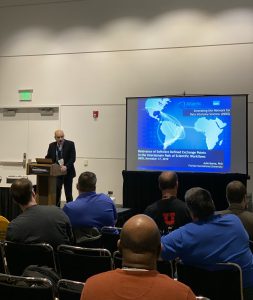 This year the Innovating the Network for Data-Intensive Science (INDIS) is excited to bring two distinguished keynote speakers: Awanish Verma, Director Marketing NFV, Acceleration Wired & Wireless Group at Xilinx and Julio Ibarra, Assistant Vice President of Technology Augmented Research at Florida International University.
This year the Innovating the Network for Data-Intensive Science (INDIS) is excited to bring two distinguished keynote speakers: Awanish Verma, Director Marketing NFV, Acceleration Wired & Wireless Group at Xilinx and Julio Ibarra, Assistant Vice President of Technology Augmented Research at Florida International University.
Supercomputing conference 2019 (SC19) hosted the 6th annual INDIS workshop on Sunday, November 17, 2019 at the Colorado Convention Center, Denver, CO.
 Dr. Julio Ibarra presented “The Relevance of Software Defined Exchange Points in the path of scientific workflows” at the INDIS workshop which brings together network engineers and researchers to share challenges and potential solutions in the information systems and networking communities.
Dr. Julio Ibarra presented “The Relevance of Software Defined Exchange Points in the path of scientific workflows” at the INDIS workshop which brings together network engineers and researchers to share challenges and potential solutions in the information systems and networking communities.
Abstract: International research network connections are increasing, providing new paths for scientific workflows to move data and work across continents: In the north Atlantic between North America and Europe, the Advanced North Atlantic (ANA) collaboration operates 740G of distributed bandwidth capacity; between the U.S. and South America, the AmLight Express and Protect (AmLight-ExP) project added three 200G optical waves between Florida and Brazil, for a total capacity of 630Gbps; the AmLight-SACS project will be activating a 100G optical wave between Brazil and Angola, establishing a new south Atlantic route between the Americas, Africa and Europe; and Bella, a project led by RedCLARA and GEANT, will provide new high-capacity network paths between South America and Europe. While this phenomenon provides the opportunity for network operators to add resiliency to the global R&E fabric, it also adds complexity to network management and traffic engineering.
Software Defined Exchange points (SDX) provide enhanced capabilities to simplify flow-management and enable new network services. Unlike traditional exchange points, an SDX controller has global visibility of the network topology, making it possible to maintain related states for the full path of a flow. This presentation will describe what an SDX is and why SDXs are relevant to scientific workflows in the global R&E network fabric. The AtlanticWave-SDX project and its SDX controller will be presented as a novel distributed programmable controller along with use cases for two science drivers. Results from extensive experiments in a testbed will be presented that demonstrate the AtlanticWave-SDX controller’s high performance in terms of scalability, response time, and resource utilization, which are extremely important to support advanced scientific applications. Finally, future work will be described to clarify where SDXs can have an impact on the global R&E network fabric.
Speaker Bio: Julio E. Ibarra, PhD, is the Assistant Vice President for Technology Augmented Research at Florida International University (FIU). Dr. Ibarra is responsible for furthering the mission of the Center for Internet Augmented Research and Assessment (CIARA) – to contribute to the pace and the quality of research at FIU through the application of advanced Cyberinfrastructure. He is responsible for strategic planning and development of advanced research networking services, including the development and management of the AMPATH International Exchange Point for Research and Education networks. He is the Principal Investigator of multiple National Science Foundation International Research Networks Connection awards, involving the design and implementation of high-throughput international network connections to enhance U.S. e- science initiatives in Latin America, and the Caribbean.